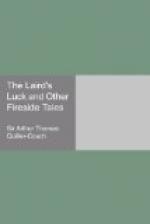Throughout this outburst I sat slicing my apple and taking now and then a glance at the speaker. It was all so hotly and honestly boyish! He only wanted justice. I know something of youngsters, and recognised the cry. Justice! It’s the one thing every boy claims confidently as his right, and probably the last thing on earth he will ever get. And this boy looked so handsome, too, sitting in his father’s chair, petulant, restive under a weight too heavy (as anyone could see) for his age. I couldn’t help liking him.
My brother told me afterwards that I pounced like any recruiting-sergeant. This I do not believe. But what, after a long pause, I said was this: “If you are innocent or unconscious of offending, you can only wait for your neighbours to explain themselves. Meanwhile, why not leave them? Why not travel, for instance?”
“Travel!” he echoed, as much as to say, “You ought to know, without my telling, that I cannot afford it.”
“Travel,” I repeated; “see the world, rub against men of your age. You might by the way do some fighting.”
He opened his eyes wide. I saw the sudden idea take hold of him, and again I liked what I saw.
“If I thought—” He broke off. “You don’t mean—” he began, and broke off again.
“I mean the Morays,” I said. “There may be difficulties; but at this moment I cannot see any real ones.”
By this time he was gripping the arms of his chair. “If I thought—” he harked back, and for the third time broke off. “What a fool I am! It’s the last thing they ever put in a boy’s head at that infernal school. If you will believe it, they wanted to make a priest of me!”
He sprang up, pushing back his chair. We carried our wine into the great hall, and sat there talking the question over before the fire. Before we parted for the night I had engaged to use all my interest to get him a commission in the Morays; and I left him pacing the hall, his mind in a whirl, but his heart (as was plain to see) exulting in his new prospects.
And certainly, when I came to inspect the castle by the next morning’s light, I could understand his longing to leave it. A gloomier, more pretentious, or worse-devised structure I never set eyes on. The Mackenzie who erected it may well have been (as the saying is) his own architect, and had either come to the end of his purse or left his heirs to decide against planting gardens, laying out approaches or even maintaining the pile in decent repair. In place of a drive a grassy cart-track, scored deep with old ruts, led through a gateless entrance into a courtyard where the slates had dropped from the roof and lay strewn like autumn leaves. On this road I encountered the young Laird returning from an early tramp with his gun; and he stood still and pointed to the castle with a grimace.
“A white elephant,” said I.
“Call it rather the corpse of one,” he answered. “Cannot you imagine some genie of the Oriental Tales dragging the beast across Europe and dumping it down here in a sudden fit of disgust? As a matter of fact my grandfather built it, and cursed us with poverty thereby. It soured my father’s life. I believe the only soul honestly proud of it is Elspeth.”




